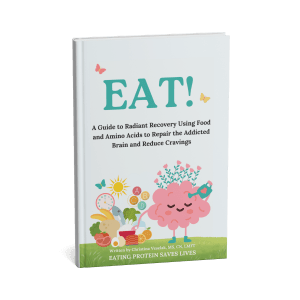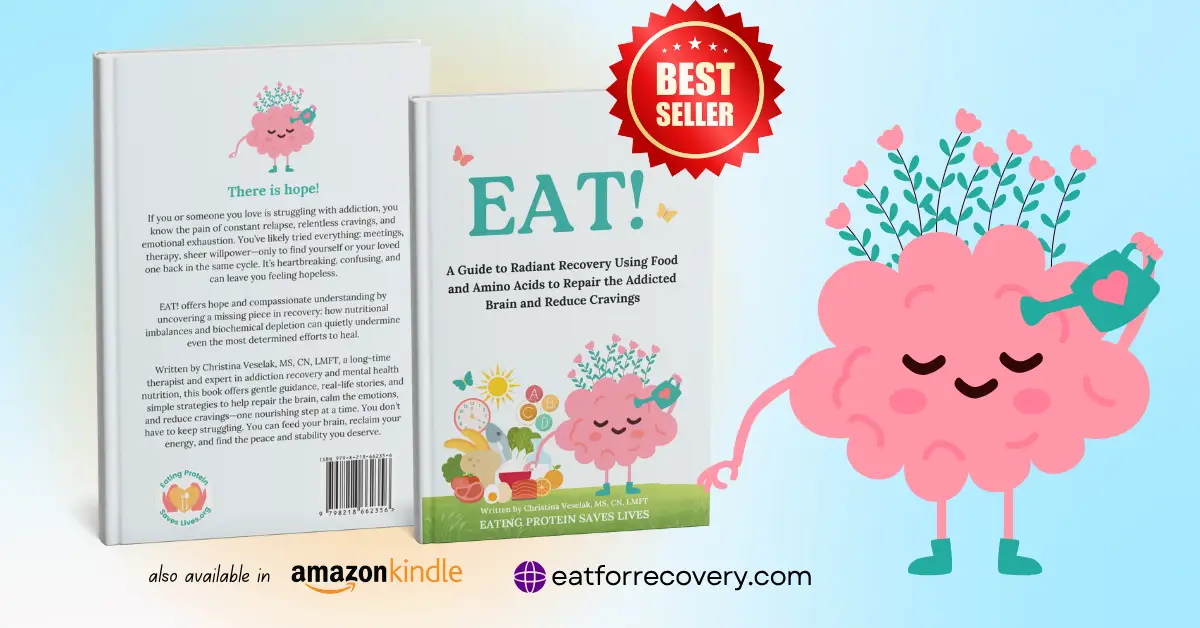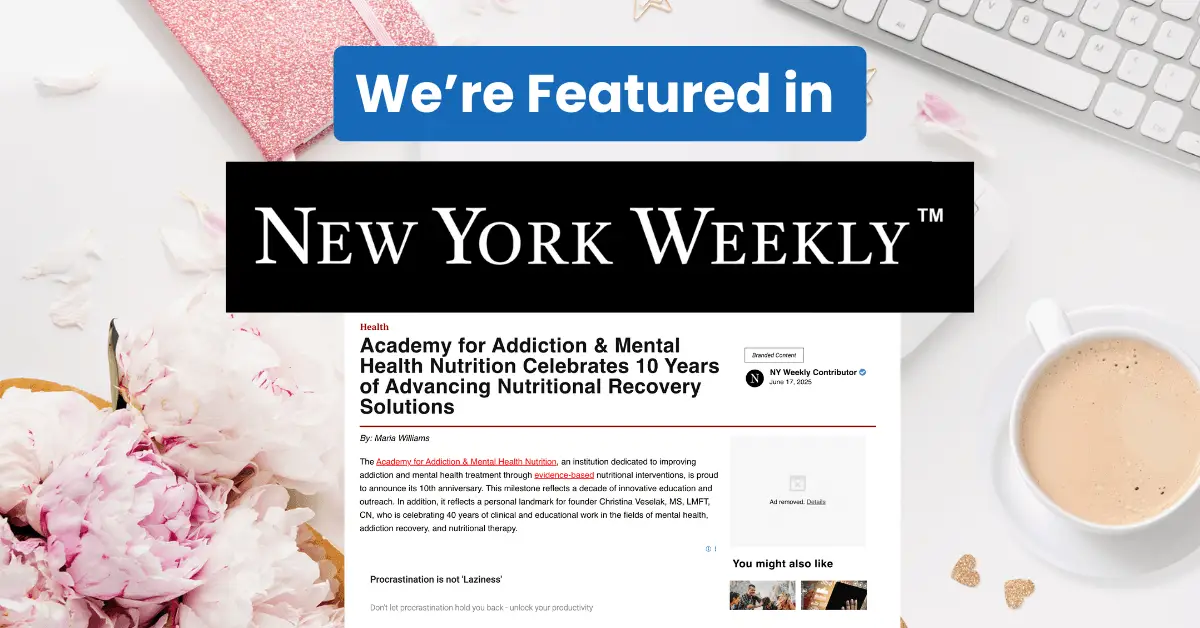Why Every Recovery Professional Needs EAT! in Their Practice Library
If you work in addiction recovery, you’ve seen this scenario play out:
A client who’s doing everything right. Showing up to sessions. Engaging in treatment. Using their tools. Fully committed to their recovery.
But they’re struggling. Intense cravings that seem to come out of nowhere. Mood swings that make every day feel like a battle. Sleep issues. Brain fog. That constant feeling of barely holding it together.
And you’re thinking, “What am I missing here?”
Often, what’s missing is the nutritional piece.
The Connection Between Brain Chemistry and Recovery
Addiction doesn’t just affect behavior and psychology. It fundamentally changes brain chemistry. And when someone stops using, their brain doesn’t automatically bounce back to normal.
The brain has been depleted of crucial neurotransmitters. Blood sugar regulation is all over the place. Sleep cycles are disrupted. The body is working with limited biochemical resources.
This isn’t about willpower or motivation. It’s about giving the brain what it physically needs to heal.
That’s exactly what EAT! A Guide to Radiant Recovery Using Food and Amino Acids to Repair the Addicted Brain and Reduce Cravings addresses.
What Makes This Book Different
This book comes from 40 years of real clinical practice. Christina Veselak is a licensed psychotherapist and addiction recovery specialist with training as a mental health nutritionist. She’s the founder and director of the Academy for Addiction and Mental Health Nutrition, where she teaches practitioners these methods, and she founded Eating Protein Saves Lives, Inc., a non-profit dedicated to spreading this information.
The book covers practical, evidence-based nutritional approaches that support brain healing during recovery. This is what actually works with real people in real practice.

The Blood Sugar Connection Most Programs Overlook
One of the most powerful concepts in the book is understanding how blood sugar instability triggers cravings and relapse.
When someone skips a meal or goes too long without eating protein, their blood sugar drops. The brain interprets this as an emergency. It can’t distinguish between low blood sugar and actual danger.
So it sends out panic signals. These feel like intense cravings, anxiety, irritability, and overwhelming urges. The brain is desperately searching for the fastest source of glucose it knows.
For someone in recovery, that’s often their substance of choice.
Your clients might describe this as “the craving came out of nowhere.” But it didn’t. Their blood sugar crashed.
The book explains why eating 20 grams of protein every 4 hours stabilizes this entire system. It keeps blood sugar steady so the brain isn’t constantly in panic mode. This one change can dramatically reduce cravings and stabilize mood.
The book walks through what 20 grams of protein looks like in real food and how to help clients implement this consistently, even if they’re not used to planning meals.
Amino Acids for Neurotransmitter Support
Another critical section covers amino acid therapy for neurotransmitter recovery.
Addiction depletes serotonin, dopamine, GABA, and endorphins. These are the neurotransmitters that regulate mood, motivation, sleep, anxiety, and the ability to experience pleasure.
When these are depleted, clients feel terrible even though they’re sober. They’re depressed. Anxious. Can’t sleep. Zero motivation. Everything feels flat.
And they start wondering if recovery is even worth it if this is how they’re going to feel.
The book explains which amino acids serve as precursors to these neurotransmitters. When the brain has the raw materials it needs, it can begin producing adequate levels again.
What’s covered:
- Which amino acids help with which symptoms
- Proper dosing and timing
- Safety considerations, especially for clients on psychiatric medications
- An assessment tool to identify which neurotransmitter systems are likely depleted
When clients feel better physically, they can actually engage in therapy. They show up for their recovery work. They have the capacity to do the difficult emotional processing that recovery requires.
The 5-Star Pro-Recovery Eating Plan
The book introduces a structured approach to nutrition that supports brain healing: the 5-Star Pro-Recovery Eating Plan.
This focuses on:
- Protein for blood sugar stability and neurotransmitter production
- Healthy fats for brain function and hormone balance
- Complex carbs for sustained energy
- Colorful vegetables for micronutrients and antioxidants
- Fruits for additional nutrients and natural sweetness
This isn’t a restrictive diet. It’s about choosing foods that make you feel good, being mindful of allergens, and avoiding harmful additives that can trigger symptoms.
The plan is practical and realistic for clients to actually follow.
Sleep and Recovery
Poor sleep is directly connected to relapse risk. When clients aren’t sleeping well, everything becomes harder. Mood regulation. Stress tolerance. Decision-making. Cravings.
The book dedicates an entire chapter to this, covering:
- How food affects sleep quality
- Which amino acids and supplements support better sleep
- Lifestyle changes that support a healthy circadian rhythm
- When sleep issues point to something else that needs attention
Sleep is when the brain does its repair work. Without quality sleep, recovery becomes exponentially more difficult.
Beyond the Brain: Other Body Systems That Impact Recovery
The book also addresses how body systems beyond the brain affect mood, behavior, and recovery success.
Things like gut health, inflammation, hormonal imbalances, and chronic health conditions all play a role. It provides guidance on identifying these issues and when to refer clients to a functional nutritionist or certified recovery nutrition coach for specialized support.
For clients with complex diagnoses like bipolar disorder or schizophrenia, it offers guidance on next steps in their recovery journey.
Overcoming Self-Sabotage
One of the later sections addresses something every practitioner has witnessed: clients who sabotage themselves even when they desperately want to succeed.
Sometimes this is about negative beliefs and mindset. Sometimes it’s about not prioritizing self-care. Sometimes it’s both.
The book helps clients understand these patterns and provides tools for creating a healthy, pro-recovery life.
But here’s the key insight: when the brain is undernourished, it’s nearly impossible to change these patterns. The biochemical foundation has to be there first.
Practical Tools You Can Use Immediately
The appendix includes assessments, guides, and scientific resources that combine actionable steps with the research behind them.
This isn’t just concepts. It’s practical information you can use with clients right away.
Whether you’re a therapist, counselor, recovery coach, nutritionist, or working in a treatment center, this book gives you tools that address a piece many programs overlook.
How Practitioners Are Using This Book
Many practitioners keep a copy in their office to reference during sessions or lend to clients. Some recommend it as a resource for clients to read on their own. Treatment centers have incorporated it into their program materials.
It’s also become a meaningful gift for colleagues, interns, or other professionals in the recovery field who want solid information on the nutrition piece.
Three Ways to Get Your Copy
The book is available in three formats to suit different needs:
Paperback – Perfect for keeping in your office, lending to clients, or as a reference you can highlight and bookmark. Great for practitioners who like to have physical resources on hand.
Kindle – Easy to reference on any device, searchable, and portable. Ideal if you want quick access to specific sections during sessions or consultations.
PDF – Downloadable for immediate access. You can print specific sections as handouts for clients or keep it on your computer for quick reference.
The Bottom Line
Recovery is challenging enough without clients fighting against brain chemistry that’s working against them.
When you address the nutritional foundation, everything else becomes more effective. Therapy works better. Coping skills are easier to use. Clients have the mental and emotional capacity to do the hard work of recovery.
EAT! gives you the tools to support clients in this crucial but often overlooked area. It’s practical, evidence-based, and ready to use immediately in your practice.
Get your copy of EAT! here: https://www.eatforrecovery.com/
Available in paperback, Kindle, or PDF.





